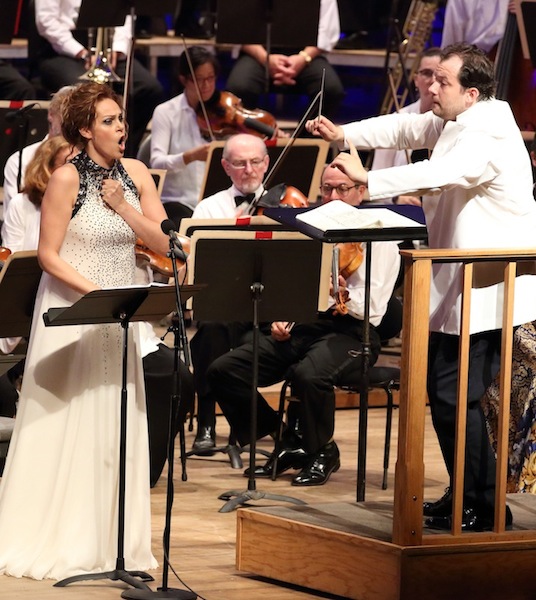Uneven singing but thrilling moments in Verdi’s “Aida” at Tanglewood

Andris Nelsons conducts Verdi’s “Aida” with soprano Kristine Opolais Saturday night at Tanglewood. Photo: Hilary Scott
During the tenure of James Levine as Boston Symphony Orchestra music director (which ended prematurely due to the conductor’s persistent health problems), concert opera was a Tanglewood staple.
Opera returned to Tanglewood Saturday night when Andris Nelsons led soloists, the Boston Symphony and Tanglewood Festival Chorus in the first two acts of Verdi’s Aida. The audience that thronged the Koussevitzky Music Shed in Lenox greeted the performance with enthusiastic cheers and bravos, clearly a sign that these concert readings of operatic classics have been missed.
Verdi’s tragic tale of the doomed love between an Egyptian military commander and an Ethiopian slave was clearly a crowd pleaser.
Nelsons’ operatic bona fides include appearances at Covent Garden, the Met and the Vienna State Opera as well as the Wagner festival at Bayreuth—where he recently departed after a staging dispute.
Nelsons clearly knows his Verdi. From the first soft bars of the prelude, he drew silky string sonorities and registered a wide dynamic palette. The big choral-orchestral climaxes really thundered with Nelsons whipping up a frenzy as the Egyptians cry for war as well as creating a splendid racket in the Triumphal Scene with additional brass stationed on both sides of the stage.
Throughout the evening, Nelson maintained both tension and energy in the more intimate scenes and drew lively, incisive and colorful playing in the ballet music. The enlarged orchestral forces consistently played with precision and corporate unanimity.
This greatest of grand operas requires six singers of stellar vocal quality in the leading roles. Yet the Tanglewood casting proved decidedly uneven with the leading soprano and tenor proving a disappointment.
Kristine Opolais (who is Nelson’s wife) has had a successful career in major opera houses primarily in Puccini roles with occasional forays into Tchaikovsky and Janacek. The title role of Verdi’s Ethiopian princess is heavy going for her basically lyric voice. In the initial trio, Opolais’ top range turned harsh under pressure. She was more effective in the score’s lyrical moments, giving Aida’s prayer for peace a poignant and dramatic edge. Still her lower register was not always audible over the orchestra. She seemed to gain strength toward the conclusion of Act II as her voice rode freely over the full orchestral and vocal ensembles.
The role of Radames calls for a heroic tenor whose voice can ring out in the house and melodically caress the ear. Andrea Care, a tenor who has performed widely in European houses, was less than adequate on both counts. Verdi was unforgiving in placing the difficult tenor aria “Celeste Aida” in the opera’s first five minutes, before the singer has had time to warm up. While Care exhibited Italianate ping and a baritonal bottom, he consistently forced his slender instrument. Despite a basically appealing timbre, he was often vocally at sea in the large scale ensemble scenes.
The lower voices clearly owned the evening. Violeta Urmana’s smoky mezzo sound and passionate intensity strongly resonated as the Egyptian princes Amneris. She utilized her musical and theatrical resources adroitly and made every note and dramatic utterance count. Although his appearance in the Triumphal Scene was brief and he tended to sing at an unrelenting forte, Franco Vassallo was authoritative as Amonasro, the captive Ethiopian king. Vassallo’s big-boned baritone
Kwangchul Youn’s smoothly produced bass conevyed the high priest Ramfis’ proclamations while Morris Robinson’s darker basso sonority brought depth and resonance to the King of Egypt. In smaller roles, Alfredo Nigro’s firm tenor gave presence to the messinger’s few lines and Bethany Worrell, a chorus member, displayed a clear, high soprano as the voice of the priestess.
For the second night in a row (following a strong showing in Rossini’s Stabat Mater), the Tanglewood Festival Chorus was a tower of strength. The sumptuous sound of the female voices was particularly outstanding in a splendidly coordinated ensemble under guest choral director James Burton.
The Tanglewood Festival continues 2:30 p.m. Sunday at the Koussevitzky Music Shed in Lenox, Massachusetts with Andris Nelsons conducting the Boston Symphony Orchestra in Berlioz’s Overture to Beatrice and Benedict, excerpts from Prokofiev’s Romeo and Juliet, George Tsontakis’ Sonnets for English horn and orchestra with soloist Robert Sheena and Saint-Saёns’ Piano Concerto No. 5 (Egyptian) with soloist Dejan Lazic. tanglewood.org.
Posted in Performances



